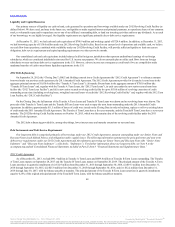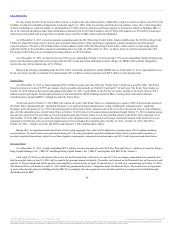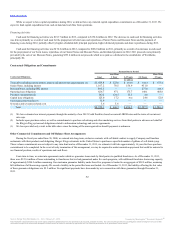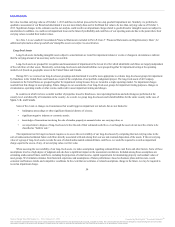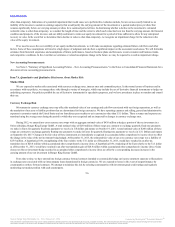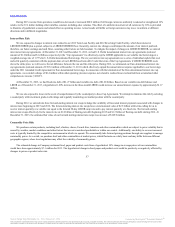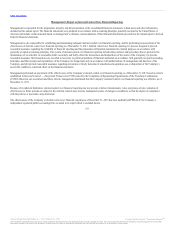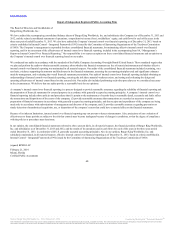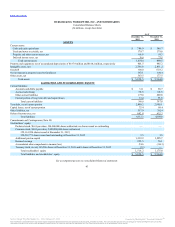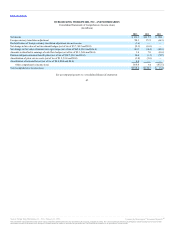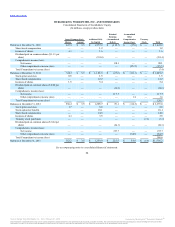Burger King 2013 Annual Report Download - page 58
Download and view the complete annual report
Please find page 58 of the 2013 Burger King annual report below. You can navigate through the pages in the report by either clicking on the pages listed below, or by using the keyword search tool below to find specific information within the annual report.
Table of Contents
other-than-temporary. Indications of a potential impairment that would cause us to perform this evaluation include, but are not necessarily limited to, an
inability of the investee to sustain an earnings capacity that would justify the carrying amount of the investment or a quoted market price per share that
remains significantly below our carrying amount per share for a sustained period of time. In determining whether a decline in the investment’s estimated
realizable value is other-than-temporary, we consider the length of time and the extent to which such value has been less than the carrying amount, the financial
condition and prospects of the investee, and our ability and intent to retain our equity investment for a period of time sufficient to allow for any anticipated
recovery in value. In the event that we determine that a decline in value is other-than-temporary, we recognize an impairment charge for the reduction in the
value of the equity investment.
If we need to assess the recoverability of our equity method investments, we will make assumptions regarding estimated future cash flows and other
factors. Some of these assumptions will involve a high degree of judgment and also bear a significant impact on the assessment conclusions. We will formulate
estimates from historical experience and assumptions of future performance, based on business plans and forecasts, recent economic and business trends,
and competitive conditions. In the event that our estimates or related assumptions change in the future, we may be required to record an impairment charge.
See Note 2, “Summary of Significant Accounting Policies – New Accounting Pronouncements,” in the Notes to Consolidated Financial Statements for a
discussion of new accounting pronouncements.
We are exposed to market risks associated with currency exchange rates, interest rates and commodity prices. In the normal course of business and in
accordance with our policies, we manage these risks through a variety of strategies, which may include the use of derivative financial instruments to hedge our
underlying exposures. Our policies prohibit the use of derivative instruments for speculative purposes, and we have procedures in place to monitor and control
their use.
Movements in currency exchange rates may affect the translated value of our earnings and cash flow associated with our foreign operations, as well as
the translation of net asset or liability positions that are denominated in foreign currencies. We have operating expenses and selling, general and administrative
expenses in countries outside the United States and our franchisees pay royalties to us in currencies other than U.S. dollars. These revenues and expenses are
translated using the average rates during the period in which they are recognized and are impacted by changes in currency exchange rates.
During 2012, we entered into cross-currency rate swaps with an aggregate notional value of $430 million to hedge a portion of the net investment in a
Swiss subsidiary, Burger King Europe GmbH. A total notional value of $230 million of these swaps are contracts to exchange quarterly fixed-rate payments
we make in Euros for quarterly fixed-rate payments we receive in US dollars and mature on October 19, 2016. A total notional value of $200 million of these
swaps are contracts to exchange quarterly floating-rate payments we make in Euros for quarterly floating-rate payments we receive in U.S. Dollars and mature
on September 28, 2017. Changes in the fair value of these instruments are immediately recognized in accumulated other comprehensive income (loss) to offset
the change in the value of the net investment being hedged. At December 31, 2013, the estimated fair value of our cross-currency rate swaps was a liability of
$25.9 million. A hypothetical 10% strengthening of the Euro relative to the U.S. dollar as of December 31, 2013, would have resulted in an after-tax
translation loss of $28.8 million within accumulated other comprehensive income (loss). A hypothetical 10% weakening of the Euro relative to the U.S. dollar
as of December 31, 2013, would have resulted in an after-tax translation gain of $28.8 million within accumulated other comprehensive income (loss). Gains
(losses) on the net investment hedge recorded in accumulated other comprehensive income (loss) are offset by a corresponding decrease (increase) in the
carrying amount of our net investment in Burger King Europe GmbH.
From time to time, we have entered into foreign currency forward contracts intended to economically hedge our income statement exposure to fluctuations
in exchange rates associated with our intercompany loans denominated in foreign currencies. We are exposed to losses in the event of nonperformance by
counterparties on these forward contracts. We attempt to minimize this risk by selecting counterparties with investment grade credit ratings and regularly
monitoring our market position with each counterparty.
56
Source: Burger King Worldwide, Inc., 10-K, February 21, 2014 Powered by Morningstar® Document Research℠
The information contained herein may not be copied, adapted or distributed and is not warranted to be accurate, complete or timely. The user assumes all risks for any damages or losses arising from any use of this
information, except to the extent such damages or losses cannot be limited or excluded by applicable law. Past financial performance is no guarantee of future results.




